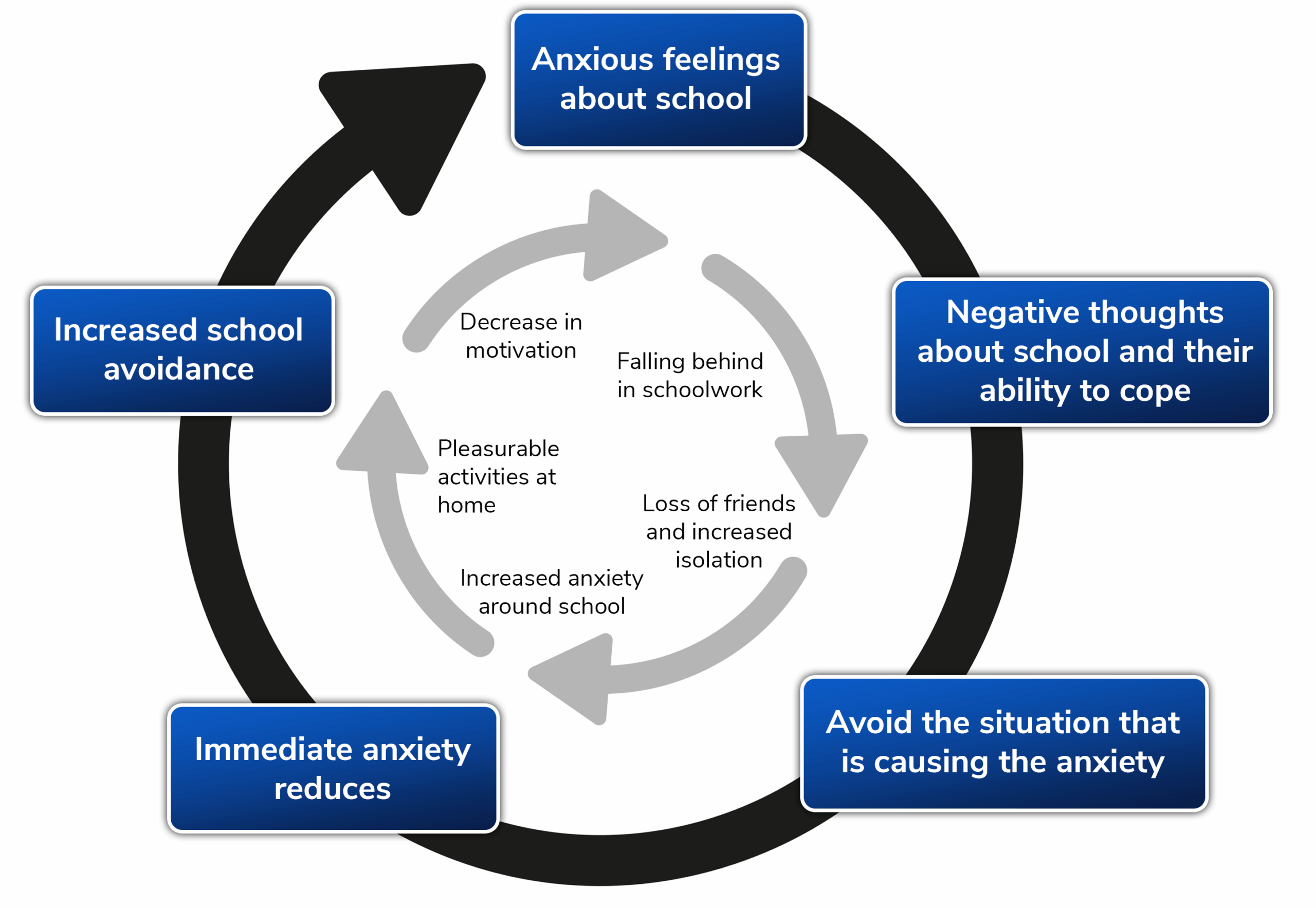Many children and young people worry about school at some point and may say they prefer being at home. This is normal.
Sometimes a child or young person’s worries become too much, and this can make it difficult for them to go to school. They may show signs of anxiety and become upset at the thought of going. This is called anxiety-based school avoidance (ABSA).

There is no single cause for ABSA. It is usually because of a number of factors, such as:
- Big changes in school life. For example, transition between school phases (from year 2 to year 3) or school (primary to secondary).
- Pressures and demands. For example, difficulties with learning or exams.
- Difficulties with peers, friends or bullying.
- School stresses. For example, noises and crowds.
- Separation, loss or bereavement.
- Changes in family circumstances. For example, moving house or parents’ relationship breaking down.
It is important that you help your child as soon as possible. The longer they are off school, the harder it becomes for them to return.
This is how anxiety about school can lead to cycle of avoidance:
 Some signs include:
Some signs include:
- Anxious feeling about school
- Negative thoughts about school and their ability to cope
- Avoid the situation that is causing the anxiety
- Immediate anxiety reduces
- Increased school avoidance
Resulting in:
- Falling behind in school work
- Loss of friends and increased isolation
- Increased anxiety around school
- Pleasurable activities at home
- Decrease in motivation
Figure 1 – The cycle of school avoidance, taken from West Sussex Educational Psychology Service guidance.

ABSA is not usually a sudden event, and we should think of it as something that can change over time.
Some of the early signs include:
- Not wanting to get ready for school.
- Feeling unwell on school days.
- Missing some lessons or avoiding things your child finds difficult in the school day. For example, the school bus, supply teachers or break time.
Here’s an example of how ABSA can develop:
- The thought of school causing occasional distress, but attending regularly
- Attending school regularly after upset or protest, this mat be more noticeable at the end of school holidays or on Sunday evenings
- Occasional reluctance to get ready for school, may complain of feeling unwell, may show distress at school drop off
- Attending but often late; possibly following a long process of support to get ready
- The thought of school causing increased distress daily. Missing occasional lessons or days of school
- Repeated absence (for example, missing one day a fortnight or patters of lessons regularly missed). May be less upset on days of non-attendance
- Not in school for a period of weeks
- Not in school for a period of months
Please note that a child’s attendance can changes in either direction; this is not a one-way process.
It is important to remember that:
- Not everyone will go through each of these stages, but early signs are usually seen at home before they are seen at school.
- Improvements in attendance and feelings about school can happen at any point.
- Showing some feelings of worry does not always lead to ABSA.
- It may be helpful to make a note of any early signs that you notice.
Children and young people who are neurodivergent (for example, who have autism, dyslexia or ADHD) may be more likely to find school difficult. This may be because neurodivergent children and young people can face extra difficulties in school, such as:
- Sensory difficulties, such as with sound, touch or light, can make school feel overwhelming. For example, busy corridors, lots of noise and bright lighting may be difficult for them to tolerate.
- Managing relationships with adults and other pupils. This can be difficult for those who have differences in understanding and predicting social situations.
- Lots of changes between activities and classrooms. This can be hard for those who find change difficult.
It takes a lot of energy and effort to cope with all this whilst trying to behave and act in ways that are expected by friends, peers, and teachers.
Every ABSA experience is different, so there is no ‘one size fits all’ advice. It is important that you try to identify what they are finding difficult or stressful in school so that you can help them.
The tools we provide on this page can be used with all children, including those who are neurodivergent. However, you will know what your child will respond to. You may feel a different approach is needed.

Being aware of the signs of ABSA can help you and the school put early support in place to help your child to feel more comfortable attending school.
There are 4 areas to look at:
- Physical – what is happening in the body
- Emotional – feelings and emotions
- Cognitive – how the brain and body work
- Behavioural – What you see your child doing
Write down any signs you may have noticed in your child and note anything extra that might not be listed. The examples do not cover all the signs – every experience of ABSA is different.
Physical
Examples of physical signs:
- Feeling sick
- Aches and pains
- Headaches
- Crying
- Sweating
- Increased heartrate
- Reduced appetite
- Complaints of feeling unwell
- Poor sleep
Emotional
Examples of emotional signs:
- Tearful
- Feeling scared
- Low mood or changes in mood
- Withdrawn or quiet
- Low confidence
- Low self esteem
Cognitive
Examples of cognitive signs:
- Negative thoughts
- Poor concentration
- Lack of motivation
- Confusion
- Learning concerns
- Difficulty starting and finishing tasks
- Speaking negatively about themselves
Behavioural
Examples of behavioural signs:
- Lateness
- Difficulty attending school or staying in class
- Seeking to stay at home for minor illness
- Lack of self-care
- Avoiding social situations
- Challenging behaviours (for example, being aggressive)
If your child if experiencing ABSA, it is helpful to think about:
- what may be adding to your child’s feelings about school, and
- what may be keeping these feelings going.
We need to try and understand the reasons they are finding it hard to go to school and think about how to support them.
Things to think about
Is there anything going on for your child or your family that may have led to or added to their ABSA? Here are some examples:
- Changes at school. For example, going from year 6 into high school.
- Difficulties in friendships or learning.
- Changes in home life or the family. For example, separation, loss, house move or a new baby.
It can help to make notes of any circumstances that may have affected your child.

There can be things that make it easier for your child to attend school, and others that make them want to stay home. We can think of these as push and pull factors.
Push factors are things that help your child go to school. Pull factors are things that make them want to stay home.
Better understanding of these factors can help with their attendance.
Make a note of the push and pull factors that affect your child. We have not listed all the factors, but here are some examples to get you started.
What helps your child go to school?
Examples include:
- Friendship group
- Good relationships with teachers
- Extra-curricular activities, such as after school clubs
- Breaks and lunch times
What makes it hard for your child to go to school?
Examples include:
- Thoughts and feelings about learning
- Difficulties with friends
- Illness
- Worries
What reasons might your child have for wanting to stay at home and why is this important to them?
Examples include:
- Wanting to stay home with parents, grandparents, or siblings because a family member is unwell
- Using technology, such as games consoles or iPad, because this gives them a sense of success and they can connect with friends
- Having quiet time because they feel school is too busy
- Finding it hard to go back to school after an absence, such as illness or school holidays, because they may be worried about being behind with learning
- Avoiding parts of school life they find tricky, such as school events, because they find change of routine difficult

They may become anxious or worried when asked to talk about this. It can help if you explain that you understand why this might be and that you would like to know more about their views and how they are feeling.
If they find it difficult to talk, you could ask them questions to help think about their thoughts and feelings. It is important to talk about strengths too and how they can be built on. Some questions you could ask are:
- What are the 3 best things about school?
- What 3 things are you most worried about?
- Who do you feel you can talk to at school?
They may find it hard to tell you face to face. You can ask them to write it down, email, text or even draw how they are feeling.
There are different activities you could use to help your child share what they are thinking and feeling. One activity to start with is looking at a good day and bad day. This can help us learn more about what matters to them and what help they may need to have more good days.
What does a good day look like? |
Prompts: What would happen when… What would you/others be doing? |
What does a bad day look like? |
|---|---|---|
| …when you wake up until you leave for school? | ||
| …on the way to school? | ||
| …when you arrive at school? | ||
| …during your lessons? | ||
| …during break time? | ||
| …during lunch time? | ||
| …on the way home? | ||
| …when you get home? |
Tools to help you talk to your child
You can download:
Having a child who is experiencing ABSA can be very difficult for you as a parent and the family as a whole.
- Seeing your child feel anxious or worried can make you feel anxious too. We all want our children to be okay and it can feel difficult when they are not.
- It is natural to feel many other feelings about your child’s difficulties at school. You may feel guilt, shame, confusion, worry, anger, frustration, sadness, or hopelessness. All of these emotions are okay and difficult to feel.
- Feeling these emotions and seeing your child upset can make it hard to know how to respond. It can be hard to find a balance between letting your child know you understand why they find it difficult and expecting them to attend school.
- Your work and day to day life and the things you want and need to do can be affected if your child is not attending school.
- You may find that leaving the house to do other things, such as exercising, shopping and taking part in hobbies, can also be difficult. Not being able to do the things you need to can impact how you feel and your patience. This can make it hard to respond calmly and with understanding.
- Not being in school everyday can lead to a loss of support for you also as you have less contact with other parents and cannot see school staff.
- Siblings can also be impacted. They might be less willing to go to school if they think their other sibling is having a ‘nice’ time at home with family or carers. You may also have less time to give them because your focus is needed on the other child.
Things to remember
- Your child may be finding it difficult now, but things can change.
- Your child is trying to cope with difficult feelings. They are doing their best with the skills they have right now.
- Work with your child’s school. They may be able to make changes that can help.
- Small changes can make a big difference.
Practicing self-care
We can think of this like the advice people are given on planes: secure your own oxygen mask first before helping others. Another saying is ‘you can’t pour from an empty cup’. To take care of others well, you must take care of yourself.
It can feel selfish at first, but you cannot help someone else to breathe if you cannot breathe yourself. It is harder to provide support to your child if you are not physically or mentally okay to.
One of the first ways to do this is by taking care of yourself. By practicing self-care, you are showing your child the importance of looking after yourself.
Research tells us there are 5 steps you can take to improve your mental health and wellbeing. These things could help you feel more able to help your child.

- Connect – Talk and listen, be there, feel connected
- Be active – Do what you can, enjoy what you do, move your mood
- Keep learning – Embrace new experiences, see opportunities, surprise yourself
- Give – Your time, your words, your presence
- Take notice – Remember the simple things that give joy
Visit the NHS website for more information on the 5 steps to mental wellbeing.
Getting support
There are lots of organisations and services that can help you and your family.

